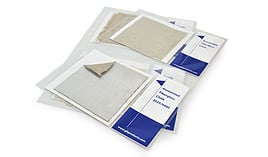The processing of industrial materials, gases, or liquids through pipelines across the globe requires careful thought in determining what is the best insulation choice, especially when it comes to piping.
What is the best choice of insulation material to use in this specific application? That is an excellent question because, even though it sounds simple, a variety of materials and choices currently exist on the market for the industrial insulator.Before deciding, many factors must be considered, such as weather conditions, temperature control, and whether the application will be above or below ground. What about personal protection? What about cost? These are just a few questions to take into consideration before picking a suitable option.

You can find a number of possible materials on the market to use in the fabrication of pipe insulation for mechanical systems. While this list is not inclusive of every possible option on the market, these are some of the more popular material currently available to the industrial insulator.
- Extruded Polystyrene (XPS)
- Polyisocyanurate
- Cellular Glass
- Mineral Wool
- Phenolic
- Melamine
- Polyethylene
However, for this discussion I will focus on one of these: mineral wool. Mineral wool has grown in popularity for solving challenging thermal issues and temperature control in industrial processes, while at the same time providing value from a cost perspective.
With an upper temperature range of 1200°F (650°C), mineral wool can be used in the fabrication of industrial insulation solutions such as fabricated pipe covering, fittings and pipe and tank wrap.
There are additional advantages that mineral wool offers over other insulation materials. It offers excellent thermal insulation when it is part of an energy efficient plan. It can also act as a sound absorber, and is considered fire-resistant as it does not contribute to the spreading of a fire or the release of toxic gasses when ignited.
What other benefits does mineral wool have? The product is highly water repellent, yet vapor permeable. Since it does not absorb water, it will not impact the R-Value negatively if exposed to moisture. Additionally, mineral wool is known to be resistant to rotting, mildew, mold, and bacterial growth. These are all characteristics to take into consideration when choosing an insulation material for mechanical piping applications.
What is the answer to the question posed at the beginning? It all depends on what your main objectives are. However, mineral wool should always be considered as an option when looking for a solution. Although cost plays a part, in the end the thermal performance of the material chosen will determine your final choice.
Want to learn more? Download our Fabricated Pipe Insulation for Mechanical Applications guide.

